Friday morning found the 6 of us (The four Heinzel-Nelson’s, Trudi and me) driving in the Landcruiser to Sakata School. Trudi had been teaching 7th grade science classes there all week and today we would be stopping by to observe her classes and to meet with a group of students to learn what the school was doing to combat deforestation. When we first began partnering with the Sakata School several years ago, the school was in an advanced state of decay.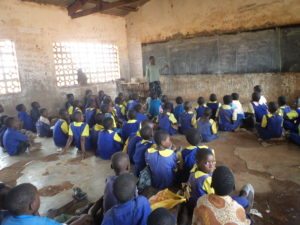 Students sat on the floor in dark, rusted, overcrowded classrooms. Holes in the crumbling roofs allowed shafts of sunlight to penetrate the darkness during the dry season, but also allowed water to enter during the rainy season. Faced with sitting amongst pools of muddy water, many students chose to remain at home during the rainy season, starting them on a path of failure and drop out. VIP and the Sakata School have made a tremendous amount of progress the past three years, building three brand new classrooms (with a fourth and a fifth on the way this year) and several beautiful teachers’ houses to help recruit top teaching talent.
Students sat on the floor in dark, rusted, overcrowded classrooms. Holes in the crumbling roofs allowed shafts of sunlight to penetrate the darkness during the dry season, but also allowed water to enter during the rainy season. Faced with sitting amongst pools of muddy water, many students chose to remain at home during the rainy season, starting them on a path of failure and drop out. VIP and the Sakata School have made a tremendous amount of progress the past three years, building three brand new classrooms (with a fourth and a fifth on the way this year) and several beautiful teachers’ houses to help recruit top teaching talent.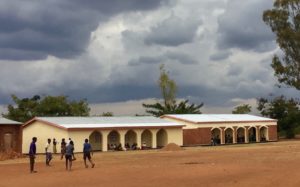 But a great deal of work remains to be done. When I arrived at the school I saw hundreds of children milling about on the dusty quad. I soon learned that the school had over a thousand registered students and only 8 official classrooms. Hundreds of children are packed into each room, with many more taking classes in a nearby church or on the ground under a small cluster of trees.
But a great deal of work remains to be done. When I arrived at the school I saw hundreds of children milling about on the dusty quad. I soon learned that the school had over a thousand registered students and only 8 official classrooms. Hundreds of children are packed into each room, with many more taking classes in a nearby church or on the ground under a small cluster of trees.
We dropped Trudi and her supplies off with Sydney at their classroom and crossed the campus to the VIP built teacher house directly opposite Trudi’s classroom, to bring painkillers to the head teacher, who had recently dislocated his knee in a motorbike accident. After spending some time chatting with the head teacher (the offending motor bike parked conspicuously in the corner of his living room) we walked across the dusty field (which had served as our soccer pitch a week ago when we had worked on the nearby Sakata Bridge) and entered Trudi’s classroom. As we entered, we saw that the students were all engaged in an experiment and that Trudi was going from group to group checking in on their progress and seeing if they had any questions. Each group of 4 had been given a mystery box, glued tight shut, with an unknown substance inside. They had then been given a second box, with a clear, removable lid, into which they could place a variety of materials. Once each set of distinct materials was inside the clear box the students could compare the different characteristics of the substances in the two boxes (weight, reaction to a magnet, tilt and sound when shaken etc.) and eventually come up with a hypothesis for what was inside the mystery box.
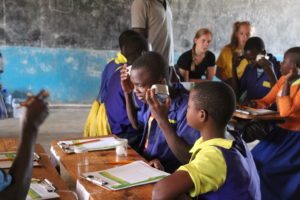
As the experiment neared its conclusion and the students began jotting down their hypotheses, I asked Trudi when we would open the mystery boxes. “We never open the boxes, we can never know for certain if we are right. That’s science.” I was excited for the day when all of the students at Sakata School would get the opportunity to learn in a bright new classroom like the one we were in, from a teacher as excited by her subject as Trudi was.
We waved goodbye to Trudi, Sydney and their students and walked back to the dusty road that we had driven in on. Directly off the road to our right and just before the campus began we noticed a cleared area with a hundred or so slender saplings poking through the soil. Clustered around and amongst the young trees were a large group of chattering students and their teacher, who spoke to us about his unique strategy for encouraging reforestation. Malawi is one of the most heavily deforested countries on earth, which has led to floods, erosion, declining soil quality and depleted ground water reserves. While VIP is first and foremost a group that serves and partners with people, we have actively embraced environmentalism, and I smiled the other day as our agricultural officer, Frank Mwenjemeka, speaking about himself, offhandedly referred to “environmentalists like me…” Because of this adoption of environmentalism, we have undertaken an initiative to restore Malawi’s forests through tree nurseries, like the one we were standing in. But forests take a long time to grow, and represent a public good, not a private one. As a result, it is very difficult to convince farmers to take time and use valuable water to ensure that young trees are properly cared for during their vulnerable early years. Because of this, several of our nurseries have failed as the trees have died due to lack of water.
What each of these young trees needed was a protector, a steward, one person who was responsible for their health and care, and who would nurture them until they reached maturity. And that is exactly what they are getting at Sakata School. The teacher speaking with us had begun a program where individual students are “given” a tree. Their name is placed on a piece of paper next to their tree, and they are responsible for watering their tree, with water from the borehole located just on the edge of the nursery, and making sure their tree makes it past its vulnerable sapling stage.
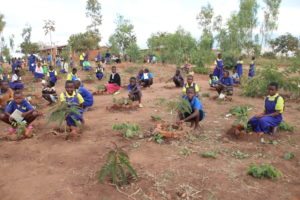
By teaching these kids to care for trees from such a young age, the school is not only ensuring that the trees in this nursery survive to maturity, but that there will be a new generation of Malawians who understand how important trees are to the health and survival of their country. Before we left we were each given an honorary tree, and we were introduced to the student who would take care of it for us. It’s nice to think that twenty years from now a group of students looking to rest after a tough exam might sit for a few minutes in the shade of the small forest lining the road into their school. And as they lean against the roots of one of the larger trees, joking and laughing with each other, if one of them casts their gaze near the roots of the great tree, they might see a small tattered placard. And if curiosity prompts them to lean in closely enough they might see, spelled out in faded black ink: “Justin Zelenka.”
Later in the day on Friday, after running some errands in town, we welcomed Ethan Rhoad, son of VIP President Bob Rhoad to N’amingazi Farm. Ethan, who had just graduated from William and Mary, was in Malawi for two months, serving as a medic near Monkey Bay on Lake Malawi. He had not been back in the country in almost nine years, since his father and he had first visited in 2008 when the Heinzel-Nelsons were living here, and he was eager to see the progress that VIP had been able to make in that time.
On Saturday morning, after an uncommonly late breakfast, perhaps in response to the late night we spent playing board games with Ethan, we all headed off to attend the primary school netball and soccer championships that VIP was sponsoring. The first game to be held was the girl’s netball championship. Netball is a cross between basketball and handball and is played on a rectangular court with raised hoops at each end, think basketball hoops, but with no backboards. Similarly to basketball, each team attempts to score goals by passing a ball down the court and shooting it through its hoop. Unlike basketball, there is no dribbling, players can’t run with the ball and a player with the ball can hold on to it for only three seconds before shooting it or passing to another player.
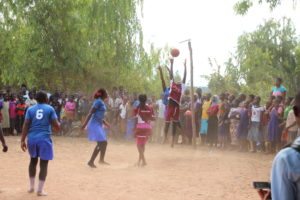
The game drew a large, excited crowd, which, even more than the rice sprinkled along the sideline, helped to form the boundaries of the court. After a competitive game, it was time for the main event, the boys’ soccer championship. Thousands of people lined the boundaries of the pitch to watch the championship game between Matawale primary school and Nyambwe primary. Although as sponsors we were supposed to remain neutral, we couldn’t help rooting for the hometown Matawale boys, especially since Sydney had once attended the school in his younger days. The hometown crowd wasn’t disappointed as Matawale won 4 goals to nil.
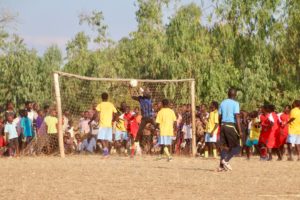
After each goal thousands of young people would storm the field dancing, celebrating and hugging. And after Stephen (as the guest of honor) presented the winning side with their trophy, the entire team and hundreds of fans ran up and down the nearby street chanting and singing while holding the trophy high. It was great to see so many young people energized and bonding over an event that VIP had helped to organize and sponsor. The hope is that in the years to come the community can continue to run fun events like this even without the help of VIP as they continue to take more ownership over the civic health of their community.
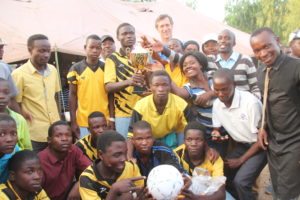
After the trophy presentations and the gifts of jerseys to each of the teams involved in the respective tournaments Liz, Jordan, Ethan and I drove over to Chimpeni School just as the sun was setting. While we had been enjoying the games all day, Vincent Chilombe and Joe Majamanda had been working hard to get solar lights installed in the deputy head teacher’s house at Chimpeni School. VIP has big plans to bring solar lighting to both Chimpeni and Sakata Schools in 2017. The lights in the teacher houses will allow our teachers to work past sundown at 6 every night, grading exams and homework and planning their lessons for the following day. As a former teacher, I can attest that most of a teacher’s work is done outside of the classroom, and our teachers in Malawi would often have wake up at 5 in the morning to catch the first rays of the sun in order to get all of their work done. Fortunately, that kind of hectic schedule will now be a thing of the past. Installing solar panels in the teacher’s houses also allows us to attract and retain top teaching talent for the schools we partner with. It is very difficult to get top teachers to come out to poor rural villages instead of settling in the major cities. And without great teachers, you can’t have a great school. But by building beautiful houses on campus and providing them with solar panels for lights, cell phones and other appliances, we can attract the very best teachers that Malawi has to offer to come and work with our students.
As we pulled up to the school Joe, Vincent and the solar contractors were just finishing the initial installation and were ready to test the lights. As the lights came on a cheer went up from those who had come to watch the test and the Deputy Head Teacher appeared to be on the verge of tears as he realized how much his life was about to change. He made his way over to Liz to thank her for everything that VIP was doing for him and for the students at Chimpeni School, who soon would be receiving solar lights in two of their classrooms, as an aid for those studying for the state exams in Standard 8.
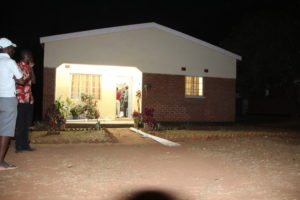
After thanking Liz he had one more request, could VIP give provide these lights to more teachers, so that they could continue to improve the standard of education throughout the Sakata region? Liz was so touched by his request and his focus on helping other families and other students rather than seeking to gain more for himself. She promised that she would do what she could and we made our way back to the Landcruiser. We drove for a few minutes through Chimpeni’s fields, but just as we were about to turn off of his property Liz stopped the car and looked back. It was past 8 now and night had completely fallen across Malawi. As we looked back across the fields, shrouded in the kind of inscrutable and complete darkness that I had never experienced back home, all of our eyes were irresistibly drawn to the same point, the soft, but steady glow of the solar powered lights glimmering through the trees. A beacon of hope and a sign of things to come.


You all are the LIGHT
Inspiring beyond words
wow love hearing from you and i had the pleasure of meeting Ed’s grandson when he was out to lunch with Ed and his friend. wonderful young man. i thought to myself how wonderful of this young man to give up 2 months to help other. very special young man for sure. love your post Justin and so look forward to each and every one of them. thanks